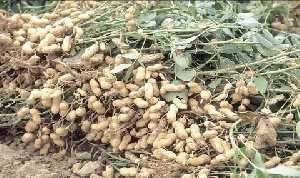Council for Scientific and Industrial Research – Savanna Agricultural Research Institute (CSIR–SARI) has developed two new varieties of groundnut and a soybean variety for cultivation.
The new groundnut varieties have been checked together with the existing ones and proven to be highly resistant to infections, which are the main concerns affecting groundnut production in the Northern, Upper East and Upper West regions.
They also produce better yields, possess nutritional benefits such as high oleic and higher amount of protein, and are early maturing.
The new soybean variety offers high grain yield of up to 3.5 tonnes per hectare, high leaf output and produces higher quality soymilk than existing varieties.
The new varieties were developed in collaboration with partners including tropical legumes II, and tropical legumes III projects, United States Agency for International Development, and Bill and Melinda Gates Foundation.
Dr Richard Oteng-Frimpong, a Research Scientist at CSIR-SARI, one of the researchers on the project, who made a presentation on the new varieties at a meeting with members of the National Variety Release and Registration Committee (NVRRC) of the Ministry of Food and Agriculture at Nyankpala, said the release of the new varieties would boost groundnut production in the country.
Members of the NVRRC visited the on-site trial of the new varieties at Nyankpala in the Tolon District of the Northern Region to assess the crops at maturity stage.
Dr Oteng-Frimpong said the new groundnut varieties also produced a lot of fodder to feed animals during the dry season adding the fodder was high in nutrients and had better digestibility.
He said the two groundnut varieties matured from 90 to 120 days adding they were suited for the northern parts of the country.
Members of the NVRRC, after assessing the varieties at maturity stage at Nyankpala and critiquing presentations by research scientists on their development, approved the new varieties for cultivation in the country.
Professor Jonathan Padi Tetteh, Acting Chairman of NVRRC, said as demanded by regulations, the NVRRC would recommend to the Minister for Food and Agriculture for the release of the new crop varieties to allow for their cultivation in the country.
Dr Stephen Nutsugah, Director of CSIR-SARI, said SARI would not relent in its efforts to come out with technologies to ensure food security in the country.
General News of Monday, 15 October 2018
Source: ghananewsagency.org
CSIR-SARI develops new groundnut, soybean varieties
Entertainment












